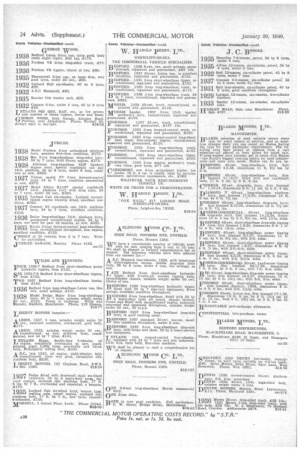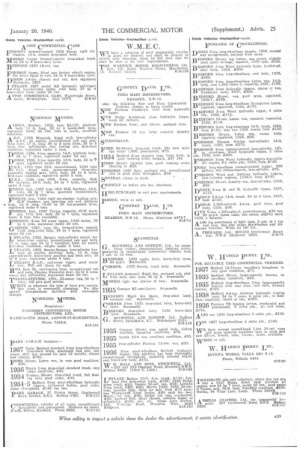Users, Railways and Road Hauliers Should Confer on a Completely
Page 48

Page 49

If you've noticed an error in this article please click here to report it so we can fix it.
New Basis, So as to We Need Give the Public their Best Service
A National Transport Council!
THERE is much. to be said for the setting-up of a body which would bring rail and road • interests into a position when some measure of rational discussion of critical prablems—and so to some degree of compromise—was possible. I do not go so far as to suggest that detestable stage called co-ordination ;
• it is far better not to pitch our hopes too high at the outset, but to be content with something less than definite pacts, treaties, rationalization, coordination, combination, arid in the last resort, nationalization.
Let us be brutally frank in facing up to the present position. The railways and the road-transport industry are in bitter and destructive rivalry for the possession of the profits aris ing from .transport service. The state, in its misguided efforts to protect the public in the first place, and railway interests in the second place, has put restrictions and official control on both forms of transport.
Piquant Situation Created by Railways It was at the instigation of the railways that road transport was shackled, and now we have the piquant situation of the railways demanding freedom for themselves, whilst leaving their rivals enchained.
Anyone who knows anything about transport is aware that this railway
move for a " square deal" is only a smoke-screen for a bigger move against road transport, for we know that the granting of the present railway demands would make no material difference in their earnings. What the railways are suffering from is not unprofitable business, but a shortage of business. Given more goods to carry, at their present rates, the railways would earn more money.
They may, however, suffer from the illusion that if high statutory rates be fixed for road transport— while the railways, if they liked, could cut their own rates, then a great flow of transport would be bansferred from road to rail.
Is this feasible ? I feel sure that the railways think it to be so, and, 538 of course, if they hold this illusion there is little prospect of any appeasement between road and rail interests. It means a new phase of war.
The railways may think that with hauliers held tight by official control, victory would be in sight. But do they take the public into account ? Do they rightly appreciate the power of traders and individuals to do their own haulage?
Road Motors Give Public Whip Hand My view is that the railways have a shrewd idea of the power which the motor vehicle gives the public to do its own transport. We have had many diatribes from railway chiefs against private cars as interfering with rail passenger-earnings, and against the vans, lorries and other vehicles of farmers, traders and industrial concerns.
We see, in Northern Ireland, new efforts to control G-licensed and similar transport, and we would seem to be approaching the stage when the railways, aided by the State, and, perhaps, with the road hauliers as temporary allies, will endeavour to limit the right of the individual to run his own motor vehicle on the public highway and to transport his own goods.
To accomplish all this would need nationalization of transport to an extent which has not yet been attempted in totalitarian countries, If we have nationalization we shall require no joint organization of railway and road interests.
I think we can rule out nationalization, and if we do this, we can rule out, also, those illusions of monopoly control over individual users of road transport, whether for passengers or goods. I have led up to this paint because I feel that the railways do not fully appreciate it.
• Both the railways and the hauliers must resign themselves to the situation that the public right to use the road must remain paramount. It is for the railways and the hauliers to provide such efficient and economic haulage service that the public will utilize this service to the fullest possible extent, and will only exercise to a limited extent its rights of individual transport. It is all a matter of economics and not a matter for compulsion, restriction or regulation.
The Demand for a Permanent Council
So I would suggest, in the first place, a permanent council of rail, road, and users' interests, as the initial step in the direction of compromise, and better relations. It is not enough to bring road and rail into a joint organization, and, much as I admire the Society of Motor Manufacturers and Traders, I do not think that it provides the right parallel.
The S.M.M. and T. is an organization of manufacturers and traders, all of which are business competitors, but competitors along the same lines. Road and. rail transport, however, are two vitally different systems competing under most dissimilar conditions.
A society of railway and road haulage operators could not function like the S.M.M. and T. This body does not control or restrict the business or competitive activities of its
members. It acts to promote the welfare of the industry as a whole, and to provide for its members the maximum business at home and abroad.
To this end the S.M.M. and T. is in friendly co-operation with motor users organizations. Suppose the motor manufacturers combined to charge monstrous prices for motor vehicles, and even to limit output in the arrogance of a complete monopoly, then the users would retaliate by encouraging other people to make vehicles. Then suppose the combine of manufacturers persuaded the State to prohibit any unauthorized concern from making motor vehicles, we should reach a stage comparable with an absolute monopoly in rail and road transport. In a democratic country, the public would then turn the Government out of office, and would restore the public right to make and supply vehicles at fair prices.
Thus we require, in transport service, a national transport council with members drawn from the public, the users, railways and road-. haulage interest's. The primary aim of this council would be to get the various parties together for friendly discussion of the one really big problem—how to supply the best transport service to the community.
As an example of what the national transport council could do, it could agree to ask Parliament to abolish Government control of the railways and, at the same time, ask it to scrap the Road and Rail Traffic Act There would be a fine example of compromise.
Road and rail and the users would fix their own fair basis of transport services and charges and the public would be induced to buy more transport. The railways would get the' share. which they deserved of this business and the road hauliers would pay fair wages, treat their men considerately, and charge fair prices. There would be healthy competition, as in every progressive business, but there would not be unfair or destructive competition, any more than there would be exploitation of the public.
Not once, but many times, wellmeaning persons have tried in this country to combine some industry or trade in a huge unit. The attempt has always failed. In America, where Trusts were allowed to grow, they had to be curbed, eventually, by the State.
Road and Rail Fusion Will Fail
No attempt to fuse rail and road transport into one combine, or even to extend the dubious experiment of the London Passenger Transport Board all over the country, will succeed. Such combinations are no better than nationalization, and the nationalization of industry is a failure which even the totalitarian countries avoid.
Consequently, the improvement of road and rail transport must be done on non-combine and non-Government lines. It must come from the joint efforts of users, rail, and road haulage interests. To this end, a national transport council would be the first big step.
To make it an effective machine, there would be suitable sub-divisions of function in this manner NATIONAL TRANSPORT COUNCIL
CcensiTri Railway RoadUsers Council haulage
Council Council Safety Highways Councii Council
The sub-councils would be elected from existing organizations. For example, the C.M.U.A., the A.R.O., and suchlike bodies would have their representatives on a transport users' council, and they, in turn, would be members of the national council. Each interest would discuss its own affairs in the appropriate sub-council, the members of which would then report to the national council.
All Government control of transport by road and rail would be abolished, and only the common law would apply. The task • of the national council, then, would be to give the public the best, safest and most economical transport on a fairprofit and a fair-wages basis.
The critic may say that this freedom would lead back to "piracy," or, in another direction that it would lead to secret combines, rings and suchlike. It would be the job of the council, however, to prevent this.
Of course, there would have to be give-and-take, or compromise. The railways would have to give up their claims to transport monopoly, or the protection of their shareholders at the public expense. But we must not allow the railways to be destroyed or crippled by uneconomic and unsound adventures in transport., The experts can hammer-out a basis of division of function on fair terms, so that each form of transport will be utilized to the best public advantage.
R.P.H.




















































































